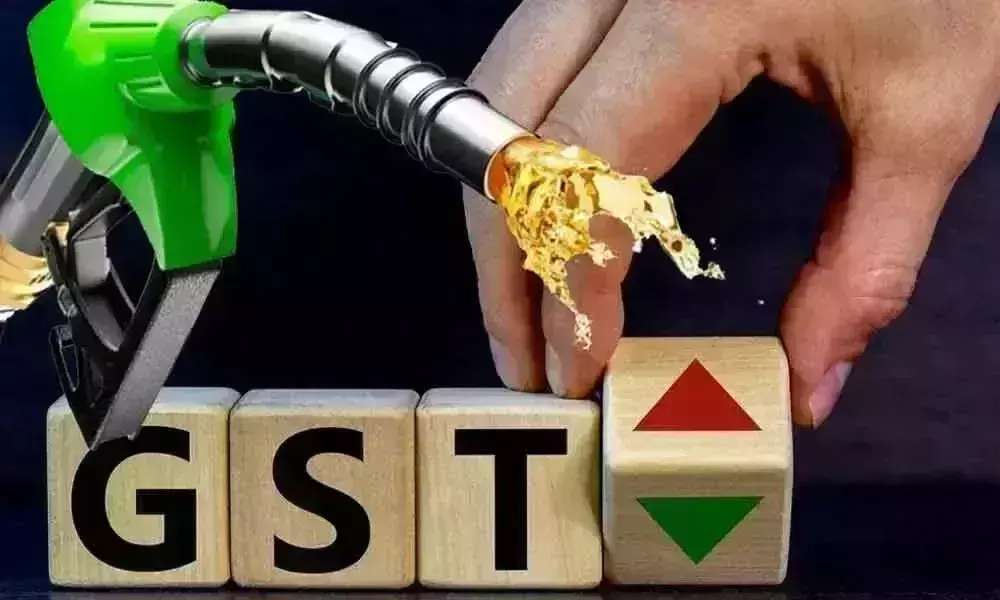
Fuel taxation under GST: Council to decide on Friday
text_fieldsNew Delhi: The 45th GST Council meeting scheduled to be taken in Lucknow on Friday is expected to discuss the possibility of bringing petroleum products including petrol, diesel, and aviation turbine fuel under the ambit of Goods and Services Tax.
The present taxation of petrol and diesel is a boon for both the Centre and the State governments and if the products are brought under the GST, there will be a significant loss in the revenue received from the sales of the petroleum products.
Meanwhile, it is a long-time demand to the Centre to bring petroleum products taxes under GST as the only solution to rein in the skyrocketing petrol and diesel prices, directly becoming the significant factor for the price rise of commodities in the country.
In June, the Kerala High Court, based on a writ petition, had asked the GST Council to decide on bringing petrol and diesel within the Goods and Services Tax (GST) ambit.
The sources said bringing petrol and diesel within GST would be placed before the Council for discussion in the light of the court asking the Council to do so.
When a national GST subsumed central taxes such as excise duty and state levies like VAT on July 1, 2017, five petroleum products, i.e. petrol, diesel, ATF, natural gas and crude oil were kept out of its purview for the time being.
This is because both central and state government finances relied heavily on taxes on these products.
Since GST is a consumption-based tax, bringing petro products under the regime would mean states where these products are sold get the revenue as opposed to states that currently derive the most benefit which have the production centres.
Simply put, Uttar Pradesh and Bihar with their huge population and a resultant high consumption would get more revenues at the cost of states like Gujarat.
With central excise and state VAT making up for almost half of the retail selling price of petrol and diesel currently, levying GST on them would mean charging a peak rate of 28 per cent plus a fixed surcharge going by the principal of the new levy being equal to the old taxes.
Tax experts said bringing petro products under GST will be a tough call for both the Centre and states as both will stand to lose. The BJP-ruled states like Gujarat will be a loser even if a product like natural gas is brought under GST as it gets a lot of revenue from taxing the local production and import of the fuel (LNG).
The Centre will also lose as the majority of the Rs 32.80 per litre excise duty on petrol and Rs 31.80 on diesel is made up of cesses, which it does not share with the states. Under GST, all revenues will be split 50:50 between the Centre and the states.
The GST Council, chaired by Finance Minister Nirmala Sitharaman, in its September 17 meeting could also discuss the modalities of continuation of compensation cess beyond June 2022.
This is the first time in 20 months that the GST Council will have a physical meeting. The last such meeting was on December 18, 2019, before the COVID-19-induced lockdowns.
The previous Council meeting was held via videoconferencing on June 12 during which tax rates on various COVID-19 essentials were reduced till September 30.
While the taxes have not come down, a spike in global oil prices on-demand recovery has pushed petrol and diesel to an all-time high, leading to demands that they be brought under the GST regime.
Including oil products in GST will not just help companies set off tax that they paid on input but will also bring about uniformity in taxation on the fuels in the country.
The Council, in its 45th meeting on Friday, would also consider extending the duty relief available on COVID-19 essentials.
Goods and services tax rates were slashed on COVID-19 drugs such as Remdesivir and Tocilizumab as well as on medical oxygen, and oxygen concentrators and other COVID-19 essentials.
Concerning compensation cess, the Council is likely to discuss the modalities for continuing of levy of cess on sin and demerit goods. The amount collected would be passed on to the states for loss in revenue on account of GST.
(With PTI inputs)






















